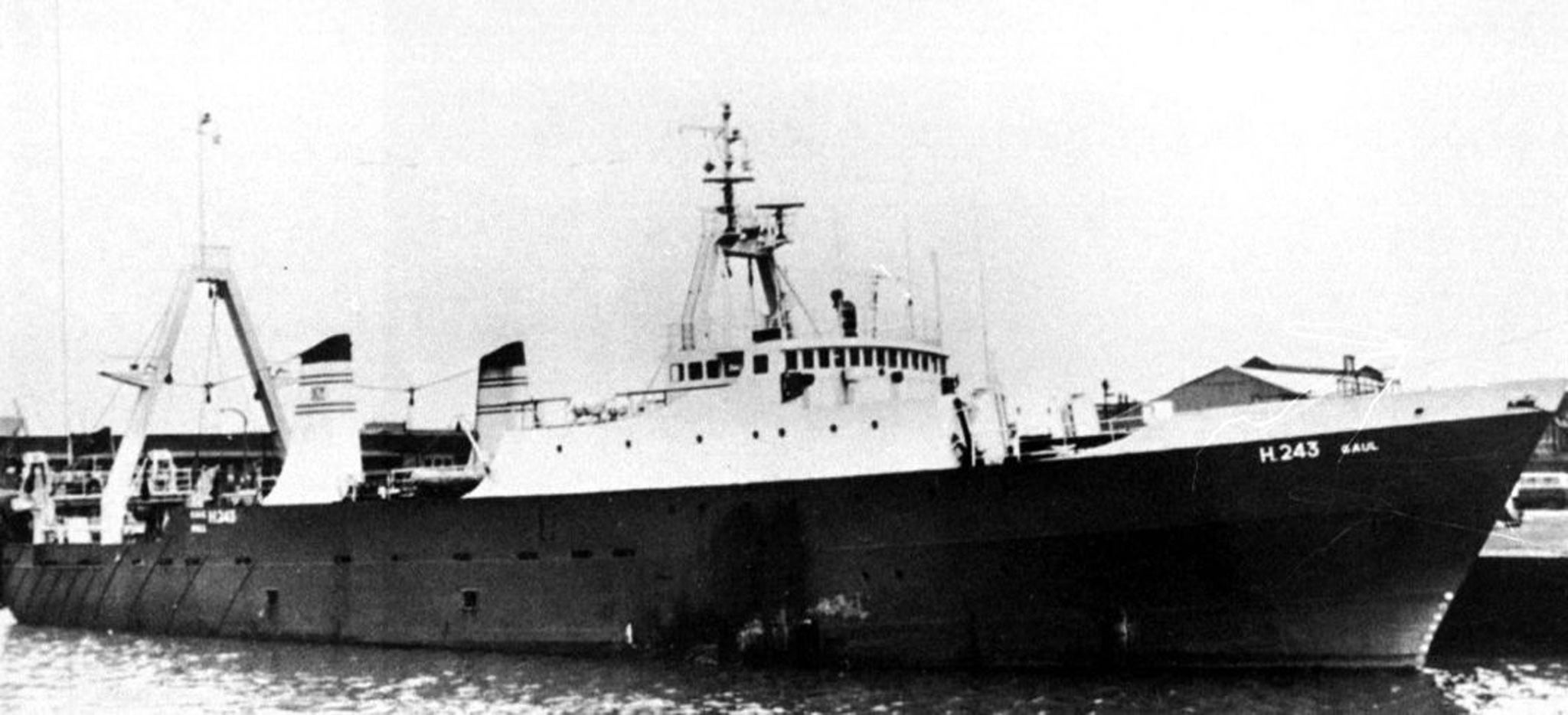Closure at last in Cold War mystery? Russian experts test human remains after 39-year hunt for Hull trawlermen
Reason for FV Gaul's demise remains subject of speculation although official 2004 inquiry ruled out conspiracy theories

British police are to work with Russian experts in an attempt finally to bring peace to grieving families of the victims of one of Britain's worst-ever tragedies at sea.
The entire crew of the supertrawler FV Gaul was lost when the Hull-based fishing vessel sank without trace off the Norwegian coast during the height of the Cold War.
No distress call was made when the 1,100 tonne ship went down during a fierce storm in the Barents Sea in February 1974 - in a decade when British trawlers were routinely used by the Navy to spy on Soviet naval movements.
The mystery of what happened to the Gaul has endured ever since, amid rumours it was spotted spying on a military complex at Murmansk and sunk by a Russian submarine.
It took more than 20 years before the wreck was finally found in 1997, after a private expedition by a TV crew.
Subsequent searches of the vessel, 70 miles off the north Norwegian coast, found the remains of just three of the 36 crew - Stan Collier, 40; James Wales, 29; and Maurice Spurgeon, 38.
But now other grieving families could finally get confirmation of what happened to their loved ones.
For the human remains of up to ten people have been found on the Rybachy peninsula, Murmansk.
A team of Russian and British experts is working together to try and match the remains to missing crew members, with DNA samples being taken from British families in a bid to help identify the remains.
In a statement, a Foreign Office spokesperson told The Independent: "The Russian authorities have been in touch formally with the FCO suggesting possible direct cooperation between the Russian authorities and Humberside Police in the new year with the aim of conducting relevant tests to identify the remains found in Murmansk."
Tonight a spokesman for the Russian Embassy, London, said: "Currently Russian forensic experts in Murmansk are running tests to determine DNA samples, those should be finished in December." They added: "We are also working on provision of remains samples to the British experts for tests in the UK."
According to the spokesman, the remains were discovered by a Russian World War Two veteran from Murmansk who was involved in previous searches many years ago and who continued to search "on his own initiative until he found those remains last year."
Assistant Chief Constable Alan Leaver from Humberside Police confirmed: "We have met all the families of the crew members lost on the Gaul and will continue to provide them with information as it becomes available."
Humberside Police "will look to work closely with the Russian authorities," who Mr Leaver praised for being "very supportive and helpful."
Experts in Russia are conducting forensic and genetic testing on the remains, and he added: "The force plan to discuss these matters in the New Year - probably towards the end of January - with the Russian authorities."
But Beryl Betts, whose 26-year-old brother Billy Jones was one of those aboard the trawler, has "mixed feelings" about the news.
"My personal opinion is that they should have told us when they were 100 per cent sure. This has spoilt Christmas," said the 74-year-old from Hull.
Other relatives are also "in a state of shock" according to Mrs Betts, who is giving a DNA sample to help in the identification process.
Freezing conditions in the region they were found mean the bodies were never buried, simply covered with rocks.
It remains unclear why it has taken almost 40 years for the remains to be found.
The location where they were discovered is consistent with the area where the crew could have washed ashore, according to Humberside Police.
Responding to the news on Wednesday Lord Prescott, former Deputy Prime Minister and Hull East MP, said the fate of the crew has been "a continuing mystery" and added: "People want an ending to this terrible tragedy."
Theories that the Russians sank the ship have been discounted by previous official investigations, and a public inquiry in 2004 into the disaster concluded the Gaul went down in heavy storms and was not deliberately sunk or pulled down by a submarine.
Lord Prescott commented: "Our trawlers were used in the Cold War. That was a practice that was unacceptable and dangerous." In the case of the Gaul: "I don't think for a second that it was sunk by the Russians but some people believe that."
Hull MPs were briefed by officials on Tuesday and Alan Johnson, Labour MP for Kingston upon Hull West and Hessle, said: "They didn't want to just go to the families and get their hopes up before they'd gone through a bit of a process of elimination, dating the remains, making sure they weren't Russian sailors...they are from the right time frame and it is becoming a reasonable possibility that these could be crew members from the Gaul."
But he admitted not all relatives have welcomed the news. "The first family member I rang yesterday said 'I wish this hadn't happened' because she had the slight feeling that her brother might still be alive. For the family members while there was no news there was hope."
Subscribe to Independent Premium to bookmark this article
Want to bookmark your favourite articles and stories to read or reference later? Start your Independent Premium subscription today.

Join our commenting forum
Join thought-provoking conversations, follow other Independent readers and see their replies